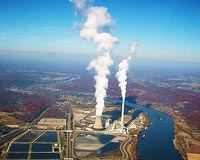| . |  |
. |
Exeter UK (SPX) Oct 06, 2010 An analysis of geological records that preserve details of the last known period of global warming has revealed 'startling' results which suggest current targets for limiting climate change are unsafe. The study by climate change experts at the University of Exeter has important implications for international negotiators aiming to agree binding targets for future greenhouse gas emission targets. Professor Chris Turney and Dr Richard Jones, both from the University's Department of Geography, have reported a comprehensive study of the Last Interglacial, a period of warming some 125,000 years ago, in the latest issue of the Journal of Quaternary Science. The results reveal the European Union target of limiting global temperature rise to less than 2 degrees C above pre-industrial levels shouldn't be considered 'safe'. From their analysis, the scientists found 263 estimates of the conditions when sediments and ice were laid down during the Last Interglacial, allowing them to reconstruct past temperatures around the globe. To compare the reconstructed estimates with today, they took the Last Interglacial values away from modern temperatures averaged over the period 1961 to 1990. The results show temperatures appear to have been more than 5 degrees C warmer in polar regions while the tropics only warmed marginally; strikingly similar to recent trends. Not only this, but taken together, the world appears to have been some 1.9 degrees C warmer when compared to preindustrial temperatures. Critically, the warmer temperatures appear to have resulted in global sea levels some 6.6 to 9.4 metres higher than today, with a rate of rise of between 6 to 9 centimetres per decade - more than double that recently observed. The higher temperatures seen during the Last Interglacial are comparable to projections for the end of this century under the low emission scenarios contained within the recent Fourth Assessment Report of the Intergovernmental Panel on Climate Change (IPCC). Professor Turney said: "The results here are quite startling and, importantly, they suggest sea levels will rise significantly higher than anticipated and that stabilizing global average temperatures at 2 degrees C above pre-industrial levels may not be considered a 'safe' target as envisaged by the European Union and others. The inevitable conclusion is emission targets will have to be lowered further still."
Share This Article With Planet Earth
Related Links University of Exeter Climate Science News - Modeling, Mitigation Adaptation
 China tells rich nations to improve emission targets
China tells rich nations to improve emission targetsTianjin, China (AFP) Oct 5, 2010 China on Tuesday told the United States and other rich nations to "dramatically" improve their greenhouse gas emission targets, blaming the countries for gridlock at UN climate change talks. Delegates from more than 170 countries are in the northern Chinese city of Tianjin this week in an effort to break the stalemate in long-running United Nations negotiations aimed at forging a deal on tac ... read more |
|
| The content herein, unless otherwise known to be public domain, are Copyright 1995-2010 - SpaceDaily. AFP and UPI Wire Stories are copyright Agence France-Presse and United Press International. ESA Portal Reports are copyright European Space Agency. All NASA sourced material is public domain. Additional copyrights may apply in whole or part to other bona fide parties. Advertising does not imply endorsement,agreement or approval of any opinions, statements or information provided by SpaceDaily on any Web page published or hosted by SpaceDaily. Privacy Statement |